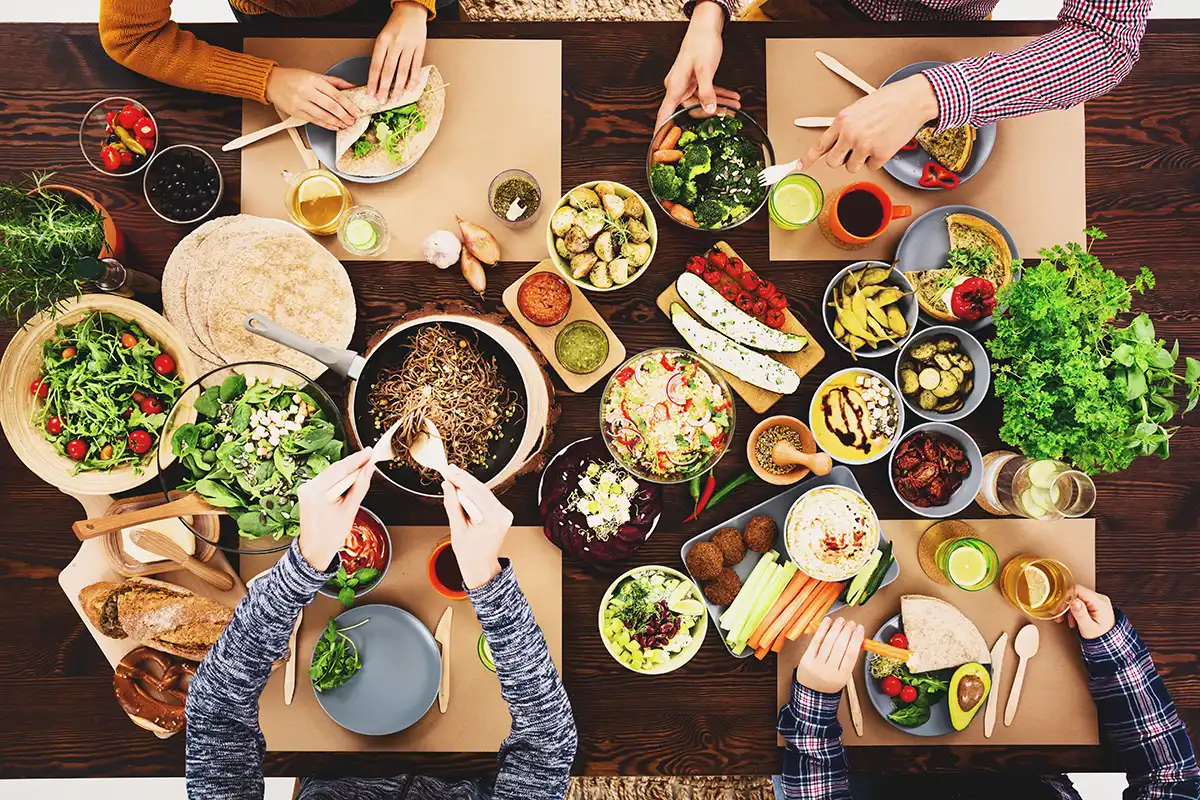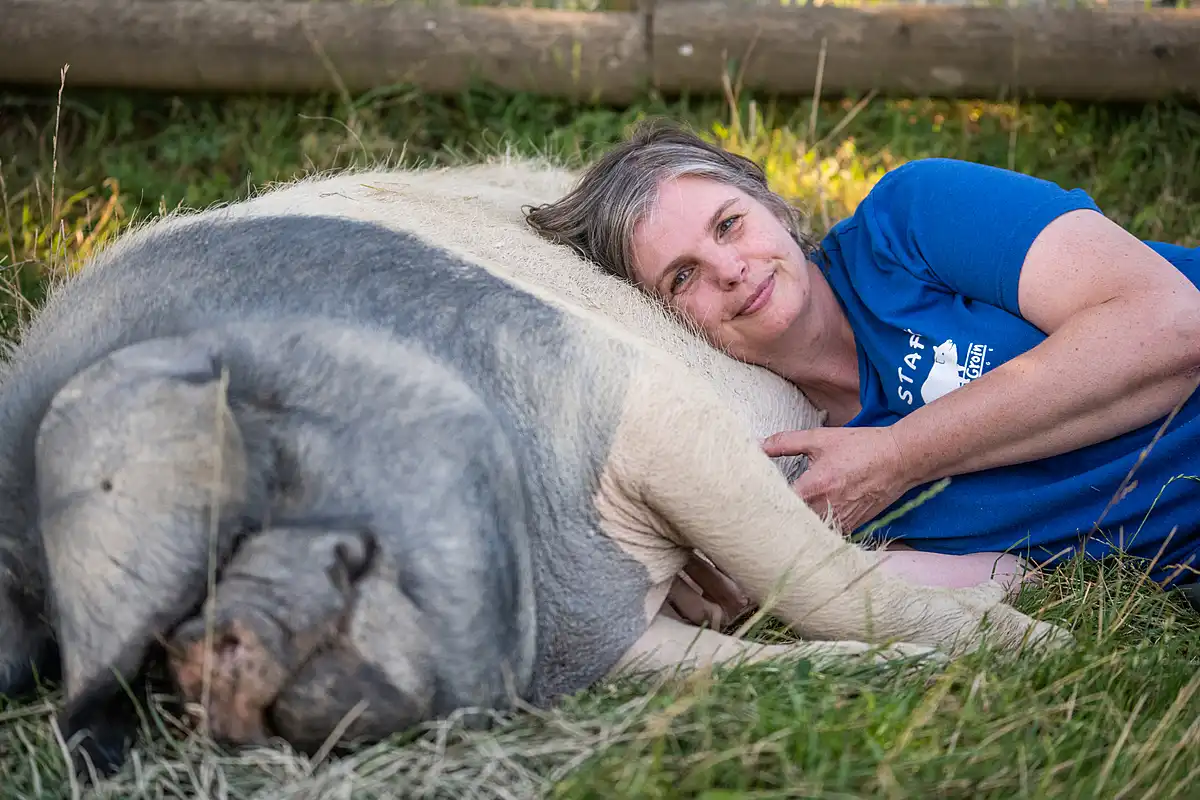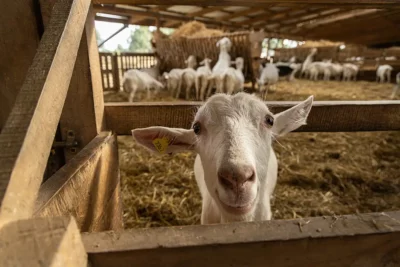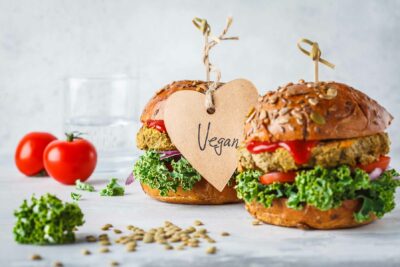There are so many important reasons why people switch to a vegan or plant-based diet, but — in a world dominated by the meat industry and its aggressive marketing and lobbying tactics — it is not always easy to stick to our principles. We may hate factory farming, want to do our best to halt the climate crisis, and seek healthier nourishment for our bodies, but if the people around us all eat meat, and it’s in every meal on every menu, and ads for it pop up a hundred times a day, things can get tricky. We get it. But just because we fell off the vegan wagon once does not mean we have to stay off it! Here we address the main reasons why people fall out of love with veganism, and share our top tips for a joyful and long-lasting reunion.
Why Do People Stop Being Vegan?
Faunalytics research found that there are seven main reasons why people stop being vegan. They are:
- Dissatisfaction with the food (50%)
- Concerns over health (30%)
- Accessibility to plant-based foods (25%)
- Loss of motivation (20%)
- Social struggles (15%)
- Cost (10%)
- It was only ever meant to be temporary (6%)
If any of these resonate with you, please read on as we make our pitch to convince you to try veganism one more time.
Vegan Food Wasn’t Great
OK, we admit it, vegan food has not always been the best, but it has improved exponentially in recent years. If you first tried being vegan more than a year ago, you may be surprised at how far the food has come.
Today, when we go to the store we may find a wide range of delicious plant-based products. No more cardboardy textures or bland rubbery options! Instead, vegan burgers taste like burgers. Vegan nuggets taste like chicken nuggets. Ice cream, yogurt, cream, milk, burgers, sausages, and so much more are available, accessible, and taste indistinguishable from their animal-based counterparts.
When it comes to cooking from scratch at home, things have also improved in leaps and bounds. Not that long ago, the recipes available to us were not that inspiring. They may have focused on a macrobiotic diet and forgotten that flavor matters. Today’s vegan recipe developers foreground taste, pleasure, and satisfaction alongside the health benefits of eating plant-based foods. They have done an exceptional job “veganizing” our most-loved dishes. Among the many recipe sites we recommend are Rainbow Plantlife, Rebel Recipes, Nora Cooks, The Vegan Nigerian, and The Domestic Gothess but there are hundreds more for you to discover.
Whatever your favorite meal is, type it into your search bar with the word “vegan” and see what comes up. Everything is possible! But if there is still one food you just cannot see yourself living without, you can still be vegan apart from that one thing. After all, being 95% vegan is 100% better than not being vegan at all.

Concerns Over Health as a Vegan
There is no dispute that a plant-based diet is associated with significantly lower rates of chronic disease, with vegans less likely to suffer from heart disease, strokes, type 2 diabetes, and some cancers. And yet, almost one-third of people who stop being vegan cite health concerns as an issue. What’s going on?
Well, the meat industry invests significant time and money to sow seeds of doubt, just as the tobacco industry did. It shouts What about choline? when it is very easy to get sufficient choline as a vegan. It screams You need milk for iodine conveniently forgetting to mention that much of the iodine in milk is a contaminant, and it comes from the disinfectant used to prevent cows’ teats from weeping their infection into the milk.
Here are the facts. We need protein, healthy fats, fiber, and many vitamins and minerals from our diets and it matters where we get them from. When we choose to fuel our bodies with a range of plant foods we get excellent complete proteins WITHOUT the harmful saturated fats and cholesterol, but WITH lots of lovely fiber and plenty of essential powerhouse nutrients.
If you felt ill as a vegan, one of two things probably happened: either you were ill for another reason (people often try veganism in response to existing health concerns, and can muddle up the two), or the foods you ate did not constitute a healthy, balanced diet. If we don’t pay attention to the foods we eat when we become vegan, we might make choices that do not support great health. We may get sidetracked by all the tasty convenience foods and forget we need to eat whole foods, too. We may not realize that removing animal products from our plates is not sufficient, and that we must find foods that contain the nutrients we need. This takes a little thought at the beginning of our vegan journey, but as time goes by, those decisions become second nature.
There is no reason anyone should become ill as a result of their plant-based diet because we can get every nutrient we need without eating animals or their eggs and milk. So, do a little nutrition research, check out our Health & Nutrition Guide, visit the Physicians Committee for Responsible Medicine website, or treat yourself to a copy of How Not to Die.
Poor Accessibility of Vegan Foods
It is true that not every neighborhood has excellent plant-based options in stores and restaurants, but these days so many do. If you haven’t checked your area recently, have another look! If you live in a large town or city, there is every chance there is great vegan food just waiting to be discovered. Plus, wherever we live, there is access to a wealth of vegan foods and ingredients online, so browse vegan stores such as Vegan Essentials and GTFO It’s Vegan (US) and The Vegan Kind and Jenninng’s Plantry (UK).
As for eating out, check out HappyCow to see which restaurants, cafes, and pubs near you have vegan options on the menu. This list is not exhaustive, so check local menus too. One great way to get more options added is to ask for them!
Losing Motivation as a Vegan
This is understandable. If you don’t work in a vegan environment, it can be easy to forget the reasons why you went vegan in the first place. But whatever your reason was, we bet that you feel the same way today. We bet you still don’t want to send animals to the slaughterhouse, nor do you want to harm the planet’s wild places, drive climate change, or increase your risk of chronic disease. So, we just need to find ways to help you match your actions to your beliefs. Here are five ways we think might help you.
- Watch some of the many excellent documentaries that lay bare the impacts of an animal-based diet. We recommend Cowspiracy, The Game Changers, Earthlings, What the Health, Seaspiracy, Land of Hope and Glory, Forks Over Knives, Eating Our Way To Extinction, and Dominion.
- Find your online tribe. There are hundreds of online groups where you can meet like-minded people and chat about the challenges and joys of being vegan. There are groups for vegan runners, knitters, bakers, musicians, animal lovers, environmentalists, athletes, parents, and so much more.
- Find vegans in real life. Us vegans are everywhere, so there is a good chance that there are vegans living in your area, too. There may be meet-ups or vegan potlucks where you can be around people who care about the same things you do, and can help you find your lost motivation.
- Read some of the fascinating books that have been written about veganism and a plant-based diet. Some of our top picks include: How Not to Die, How to Go Vegan, This is Vegan Propaganda, Eating Animals, Farmageddon, and The Meat Racket.
- Take part in one of our free guided vegan challenges. Choose a 7-day challenge as a super-achievable introduction, and opt to focus on your main motivation: animals, environment, health, or humanity. Or you can sign up for our comprehensive 30-day challenge.

Social Struggles for Vegans
The hardest part of being vegan for many people is being around non-vegans all the time, and trying to navigate a social life as the odd one out. We hear you! The first thing here is to address your motivation (see above) and to remind yourself why being vegan is so important. The second thing is to tend to our own education.
You may already have noticed that, when faced with a new vegan, every non-vegan becomes a nutrition expert, and they do their best to convince you that you will get sick, and may well expire before the day is out. They are wrong, of course, but the power of their misguided conviction can sometimes overpower what we know to be true. Educating ourselves about health and nutrition is essential for our own wellbeing, but it is also invaluable when it comes to defending our choices.
Although this is your decision, it does affect others so clear and calm communication is key. Speak to your family and friends about your decision, and why it matters to you. This is usually best done one to one, as that allows you to answer any questions, and ensures that the other person really hears you. If they love you, which of course they do, they will come to respect your decision, even if that takes a little time.
Their acceptance makes the practical challenges much easier to navigate. Your family and friends will come to understand that any restaurants they book should have vegan options and that you will need to be catered for at any meals or events they host. This is not a one-way street. It will require some compromise on your part, too, such as offering to make some of the dishes for a family get-together or agreeing to eat out where you know the vegan options aren’t super inspiring.
One issue that needs careful navigating is cooking for a family where not everyone will eat a vegan meal. In that case, we suggest creating a weekly meal plan where it takes minimal adaptations to please everyone. Pizza, for example, can have vegan or non-vegan toppings while stir fry can be made vegan, with the non-vegan element added for those who want it. You may also find some vegan recipes that suit everyone, such as chili non carne made with soy grounds or lentils, which tastes no different to chili made with meat. With a bank of simple recipes that you can rely on, mealtimes do not have to be hard work.
Take a look at our favorite story about the power of communicating your principles with your loved ones.
The Cost of Being Vegan
It was commonly thought that being vegan was expensive and therefore something that could be adopted only by the privileged few. This is not so. A study by Oxford University concluded that plant-based eating is actually the most affordable diet, and research in both Portugal and the United States corroborates this.
The myth of veganism being expensive came about because in stores plant milk often costs more than cows’ milk and veggie burgers can cost more than meat burgers. But there are a couple of things to bear in mind. First, meat and milk are VERY expensive, and it is only because we prop up these industries with subsidies that we have already paid for with our taxes that they appear to be cheaper.
Second, while those alternative vegan products may be more expensive at the till, overall, the cost of our shopping still decreases because whole foods like grains, vegetables, and beans are among the cheapest items in the store. If we cook predominantly using healthy whole ingredients like these, not only do we eat sustainably and healthily, we eat cheaply. The money we save allows us to spend a little more on those vegan convenience foods and still bring home some change.

Vegan for the Short Term
A small percentage of former vegans set out to be vegan only for a short period, perhaps as part of a vegan challenge or as a personal goal to help them get fitter. They never intended to stick with it. If this is you, then that is perfectly understandable. But whatever reasons propelled you to try a plant-based diet for that period remain valid. And the longer we stay vegan, the bigger the gains: more animals are spared the misery of a factory farm; fewer climate-altering emissions are released; there is less pollution and deforestation, and more biodiversity; we increase our chances of enjoying better long-term health, and we reduce the risk of pandemics and antibiotic-resistant infections for the entire human population.
Even if you intended to be vegan for a short time, you are not bound by that decision forever. You can always remind yourself of the overwhelming benefits and try again.
Have We Won You Back?
The suffering of farmed animals is too horrific to witness, and so we may look the other way and continue to fund their pain with our food purchases.
The Earth is on the verge of five catastrophic climate tipping points, and our consumption of meat, dairy, and eggs is driving this disaster.
Deforestation, habitat loss, and the global loss of wildlife is driven in large part by meat production and consumption.
Populations in the global north experience a raft of chronic diseases linked to the animal-based foods we eat that shorten our lives and make them harder to bear.
We have created a food system that is bad for absolutely everyone… except the $2 trillion meat industry.
Choosing to eat plant-based — or at least as plant-based as possible given any specific limitations we may face — is the answer to all these problems. Isn’t it time to try again?
Take part in our free 7-day or 30-day vegan challenges and let us support you in your effort to make the world a kinder, safer, happier, healthier place.



